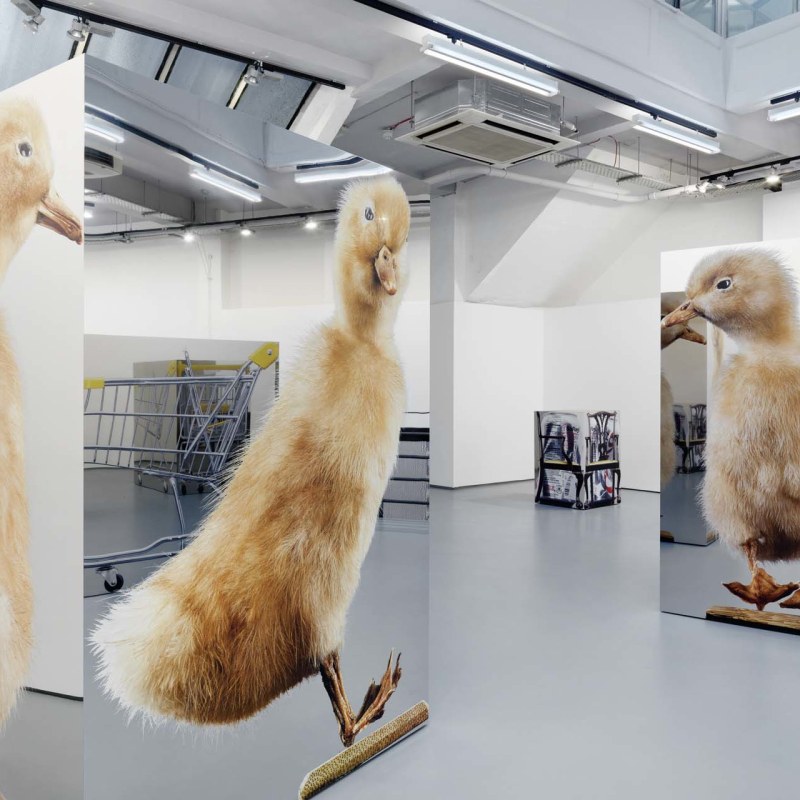Urs Fischer‘s major exhibition of new sculptures, Douglas Sirk, marks the inauguration of the new Sadie Coles gallery space in London‘s West End. The artist has built a hall of cuboid mirrors—chrome-steel boxes screenprinted with dazzlingly high-resolution images showing five views (front, back, sides and top) of miscellaneous objects. A high-heeled boot, taxidermy duckling, onion and various other ephemera have been photographically dissected and reproduced across the boxes' five exposed planes in 'hyper-real' definition. The items are surreally enlarged—their amplified scale accentuating their intrinsic forms—yet they hover inside the borders of their reflective portals with cartoonish lightness: Fischer has commented that he intends for the images to "float" and their supports to dissolve.
The sculptures are a continuation of the extensive series exhibited last year at the New Museum in New York, Service à la française (2009), arguably Fischer's most ambitious project to date. This new exhibition is titled in homage to the mid-twentieth-century film director Douglas Sirk, famous for weepy suburban melodramas shot in shimmering Technicolor. Sirk's kitsch scenography and sensational storylines mask a subtle critique of social conformity in the 1950s; moreover his pictures abound tellingly with mirrors, screens and window panes in which characters are artfully reflected, framed and divided.
Fischer‘s new sculptures distil and reformulate physical reality in a process described by curator Bice Curiger as a "cubing of the sphere". The peeled and divided clementine represented on one of the boxes is an apt emblem of this strategy of segmentation, whereby material forms are schematized into 'cardboard cutouts' while paradoxically conveying a beguiling illusion of three-dimensionality. Several of the objects depicted are replicas, toys or miniaturisations (such as a doll's house), whose incongruous amplification results in an ambiguous and dizzying upending of scale while laying bare the fundamental disjunction between reality and its imaginative re-castings.
In common with much of Fischer‘s art, the works carry understated references to art history, from Michelangelo Pistoletto‘s printed mirrors to still life painting and its use of fruit as a vanitas symbol. The pristine images furthermore recall the fetishised commodities of Pop Art and commercial still life photography, although Fischer‘s objects are often contrastingly lacklustre—as Curiger notes: "These wares, unlike those promoted by advertising, have no lifestyle appeal: They are of questionable taste and they are not new or fresh". The objects also echo the artist‘s earlier works; fruit appears repeatedly in his sculptures, while the utilitarian modernist chair shown on one box reprises a key motif (chairs serve throughout Fischer‘s work as surreal and tragicomic stand-ins for the human form).
Each work reaches out to the next in a chain of signification—an effect underscored by the mirrors‘ vertiginous effects of visual extension. The differently sized boxes form a virtual-reality labyrinth as viewers move between them, and are captured and multiplied in a Baroque myriad of reflections. In this respect, the installation recalls Fischer‘s earlier works involving mirrors, such as his sculpture Dr. Katzelberg (Zivilisationsruine) (1999) which contains multiple mirror cubes placed at right angles to one another, with a few small pieces of mirror resembling cats. In Death of a Moment (2007), two entire walls are equipped with floor-to-ceiling mirrors and set in motion by a hydraulic system, to create the surreal effect of a room in flux, morphing in shape and size.
Urs Fischer traverses the fields of painting, sculpture and installation, as well as photography and drawing, in a multifaceted body of work that eludes formal or generic categorisation, coaxing comparisons with the multifarious practices of Martin Kippenberger, Franz West, Fischli & Weiss and others.
Urs Fischer was born in Switzerland in 1973. He has had solo shows throughout Europe and the USA, including Oscar the Grouch, Brant Foundation, Greenwich (CT) (2010) and Marguerite de Ponty, New Museum, New York (2009). In 2004, Not My House Not My Fire took place at Espace 315, Centre Georges Pompidou, Paris, and the retrospective Urs Fischer: Kir Royal was held at the Kunsthaus Zürich, Switzerland. Urs Fischer‘s work has been included in numerous group exhibitions including the Venice Biennale in 2003 and 2007.
For further information please contact James Cahill on +44 [0] 20 7493 8611 or james@sadiecoles.com Opening hours Tuesday – Saturday 10 – 6pm
